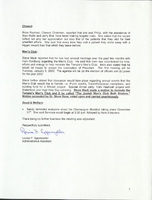Search the Special Collections and Archives Portal
Search Results

Transcript of interview with Patricia Ross by Judy Harrell, March 19, 2014
Date
Archival Collection
Description
Patty Ann Drew’s life experiences capture large movements in Las Vegas history: mob-dominated gambling, the Helldorado Rodeo, explosive growth, medical advances, and Clark County School District’s Sixth Grade Centers—all in a desert city centered in the Mormon Culture Region. Patty arrived in Las Vegas as an infant with her parents and older brothers in 1944 and was raised in the Huntridge area, where she and her brothers attended John S. Park Elementary School and matriculated from there to Las Vegas High School. In this interview, Patty talks about her parents working on the Strip, her school days, joining the Church of Jesus Christ of Latter-day Saints, marrying her high school sweetheart, and becoming a young mother in Las Vegas. After Patty married her second husband, Thomas Ross, the couple built a house west of Jones Boulevard and Patty gave birth to her third son. In addition, she returned to school to earn her Bachelor’s and Master’s degrees and taught at C. H. Decker Elementary School for twenty years.
Text

Interview with Navor Tito Valdez, June 20, 2005
Date
Archival Collection
Description
Text

Transcript of interview with Don Laughlin by Stefani Evans and Claytee White, October 10, 2016
Date
Archival Collection
Description
Minnesotan Don Laughlin landed far from the land of (more than) 10,000 lakes. His office 90 miles south of Las Vegas in the eponymous town of Laughlin commands an unimpeded view of a very different landscape from that of his youth. Here, where the Colorado River flows south through one of its narrowest channels, Laughlin arrived in about 1966 and purchased what would become the Riverside Resort Hotel and Casino. The endeavor was so successful that the then-settlement of 10 to 15 people at that tiny spot on the river grew to be an unincorporated town housing more than 7,000 people in 2010. Today, Laughlin the man continues to promote and support Laughlin the town via flood control projects and infrastructure development. In this interview, Laughlin sits amid the antique slot machines in his office and enjoys the view as he recalls his childhood on the family farm in southern Minnesota, and talks about leaving the farm in the late 1940s for nearby Owatonna to do watchmaking and watch repairing while simultaneously running a slot machine and pinball parlor. After visiting Las Vegas on vacation, he arrived permanently in 1952 and bartended at the Thunderbird Hotel until he bought his own bar and restaurant in Downtown Las Vegas, which he named Laughlin’s Made Right Café. After selling the café, he bought the 101 Club in North Las Vegas. He began searching for a casino for a casino to buy, seeking only those located on the border of a state that did not allow gambling. When he found the small hotel/casino on the Colorado River he purchased it. He talks of building an airstrip across the street and making daily trips to Las Vegas to buy groceries, beer, and toilet paper-essentially, everything one would need to run a hotel, restaurant, and casino-sometimes making three trips in one day. He continues to own and manage his hotel/casino at the age of 85, and he is in his office every day, all day, seven days a week. He gave up flying last year because he claims he’s too old to pilot his own aircraft. So is especially advantageous that the town that bears his name can now supply almost everything that he and the Riverside Resort Hotel and Casino need.
Text

Cindy Baca oral history interview: transcript
Date
Archival Collection
Description
Oral history interview with Cindy Baca conducted by Barbara Tabach on May 22, 2019 for the Remembering 1 October Oral History Project. Cindy Baca, born and raised in Las Vegas, talks about her family and occupation as a librarian at Escobedo Middle School. Cindy's twin daughters were present and injured during the Route 91 Festival and October 1 shooting. She describes their experiences and the Random Acts of Kindness project she piloted at her school after the incident.
Text

Alpha Kappa Alpha Sorority program calendar
Date
Archival Collection
Description
From the Alpha Kappa Alpha Sorority, Incorporated, Theta Theta Omega Chapter Records (MS-01014) -- Chapter records file.
Text

Minutes from Temple Beth Sholom Board of Directors meetings, June 1999 - December 1999
Date
Archival Collection
Description
Meeting minutes include reports from committees of the board, correspondence, and balance sheets.
Text

Transcript of interview with Gertrude Rudiak by Claytee White, January 11, 2007
Date
Archival Collection
Description
Gertrude (n?e Rightman) Rudiak was born in 1915 in North Dakota to Russian immigrants. She grew up in Wisconsin until 1924. That was the year the family drove to California via the Yellowstone Trail, a dusty, undeveloped road marked by yellow stones. In Los Angeles, her father practiced chiropractic, a holistic approach to well-being for which there was little knowledge at the time. Gertrude earned her music degree at University of California at Berkeley; a decision that did not lead to a career. She then attended a business college and got a job as a social worker in Northern California. In 1941, she met and soon married George Rudiak. It was the advent of World War II. George enlisted in the service and was assigned to Las Vegas Gunnery School (Nellis Air Force Base.) Since he had a law degree from University of California at Berkeley and passed the Nevada Bar exam, he found supplemental employment with local attorneys. Las Vegas became the Rudiaks? permanent home where they raised their five children. In this interview Gertrude recalls the stories of coming to live in Las Vegas of the 1940?s: their phone number was 1-2-3; the neighborhood they lived in longest being Scotch 80s and being part of the secular and Jewish communities.
Text

Transcript of interview with Mahamed Youssouf by Barbara Tabach, August 6, 2013 & August 13, 2013
Date
Archival Collection
Description
Ethiopian business owner Mahamed Youssouf became an American citizen in 1986. Born in Harar, Ethiopia, he recalls the hardships he had to endure during the Ethiopia-Somalia conflict. Coming from a family of tailors, he began making clothes with his father at a very early age. Mahamed’s recollections concerning his journey from political refugee to successful businessman demonstrates his resilience and determination to overcome obstacles and achieve his goals. Mahamed moved to Las Vegas, Nevada in 1985, where he rented a storefront in North Las Vegas. The name of his store was Uniform Plus and he focused mainly on making children’s clothes. His efforts proved lucrative as he began buying wholesale in Los Angeles, California, and selling clothes in Las Vegas on the weekends at the outdoor Swap Meet. After a fateful encounter, Mahamed became business partners with Eugene Hoffman, owner of Village East Cleaners. Mahamed firmly believes that communication is the key to socio-economic success. He views education as an investment and states that, “to have dialogue means better relationships.” When the Ethiopian government was overthrown, Mahamed returned home to Africa for a visit. He met his wife while there, got married, and started a family. Mahamed returned to America and bought a family home in Las Vegas. He dedicated his time to teaching his American born children more about Ethiopian culture and taught himself more about American culture— including the African-American experience in Las Vegas, racism, the Moulin Rouge, and the Westside.
Text

Transcript of interview with Susan Jones Watson by Claytee White, February 20, 2013
Date
Archival Collection
Description
A resident of Southern Nevada from the age of three, Susan Watson shares her memories of growing up and living in Las Vegas. After a year in Boulder City, Susan's father bought an old army barrack and converted it to a home in North Las Vegas; Susan remembers playing in the desert with her siblings and attending elementary and middle school before starting at Rancho High. Watching her mother design costumes for Strip performers and beautiful dresses for her own high school dances no doubt helped Susan develop her own sense of taste and style - something that she would put to good use over many years as an interior designer. Before that though, Susan shares her memories of what life was like in the Las Vegas of the 1950s and 1960s: cruising Fremont Street; movie nights; after-school work; favorite teachers; lunches on the lawn; and dance club. All combine to paint a vivid picture of a smaller town and a simpler time in the Las Vegas valley.
Text

Transcript of interview with Steven Liguori by Claytee White, January 20, 2010
Date
Archival Collection
Description
Steven Ligouri is an artist who is a born and raised Nevadan whose artistic creations can be enjoyed at such places as the Hoover Dam, where his famous High Scaler sits comfortably [above left photo]. The stories of this statue and others are included within this interview. Steve began mastering his trade as a youngster making jewelry with assistance of his father, Bruno Ligouri who owned a turquoise shop in Boulder City. Since his birth in 1962, Steve has lived in several locations: a family farm in North Las Vegas, John S. Park neighborhood, in Boulder City, and eventually back to John S. Park. Returning to the John S. Park neighborhood after a 22-year absence gives him the chance to reflect on the changes that have occurred. Steve fondly calls the neighborhood "home" and firmly believes it can reach its potential.
Text
